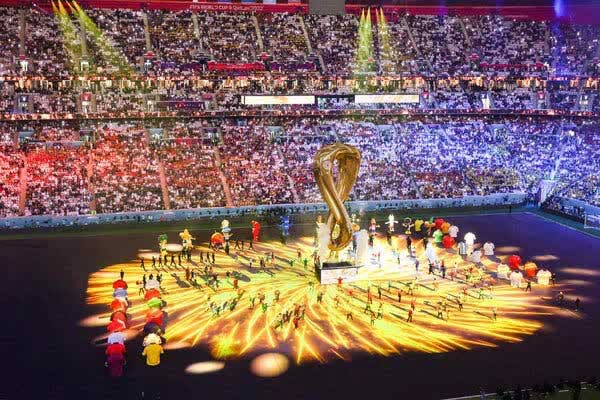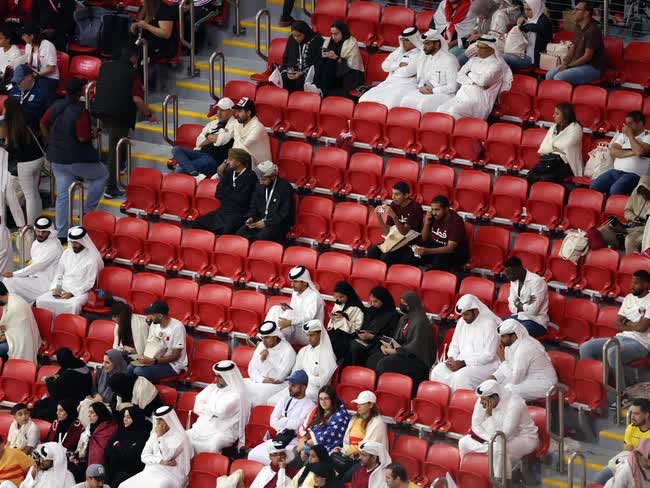As the second half of the first match of the 2022 World Cup began, thousands of seats in the stands were empty, despite the fact that people in Qatar had waited over a decade for this day.
Starting from noon on November 19, thousands of migrant workers gathered at a stadium in the outskirts of Doha, the capital of Qatar, to watch the first World Cup opening match in the Middle East. They eagerly took selfies in the stands and sat on the grass. A fan zone was set up in the industrial area with a giant screen for viewers. It was located right next to some worker camps where hundreds of thousands of low-income laborers lived.
Ronald Ssenyondo, a 25-year-old from Uganda, stated: “We are here to enjoy the fruits of our labor. I have lived here for two years, working long hours under the sun to help build the stadiums for the tournament. I am overwhelmed by what I am seeing right now.”


In the free screening stadium, the atmosphere is lively and crowded with people.
The wealthy nation of Qatar has a population of 2.9 million, but that doesn’t mean it has nearly 3 million wealthy people. The reality is that the majority of them are foreign workers, ranging from low-income construction workers to high-level executives. Tickets for the opening match averaged $200, which is not affordable for everyone. Therefore, those with lower incomes chose to watch indirectly through screens at the free stadium.
Ali Jammal, 26, who has worked in Qatar for five years, said: “I need to send money back to support my siblings in Ethiopia, so I came here because the tickets are too expensive.”
A nurse from Nepal—one of the few women attending—said she would not be able to watch any more matches due to her long shifts at the hospital where she works.
Mohammad Ansar, a 28-year-old from India who has been working in Qatar since early 2022, said he is a FIFA volunteer for two of the upcoming matches. That is the only way he has a chance to watch the matches live.
A Start Far from Qatari Expectations
Meanwhile, at Al Bayt Stadium, where the match between Qatar and Ecuador took place, the scene was quite different. Long before the final whistle blew, many home fans among the 67,372 spectators began heading toward the exits. They left right after forward Enner Valencia scored Ecuador’s second goal, just half an hour into the official kickoff of the 2022 World Cup.
As the second half began, one could see rows of empty seats throughout the stadium. This was supposed to be an evening filled with joyful celebrations and fervent optimism, a night for which the people of Qatar had prepared for a decade.

Empty seats in the area for Qatari fans
This scene was in stark contrast to the atmosphere just hours before the match began at the stadium in Al Khor, located 50 km north of Doha. Thousands arrived at the vast Lusail train station, where a special subway line built for this tournament, costing $36 billion, was completed. They then boarded a fleet of buses to the stadium. Security forces appeared tense, knowing that the eyes of the entire world were focused on this Gulf nation, which many critics argue should never have been awarded the World Cup hosting rights.
Carlos Alvear, an Ecuadorian who flew to Qatar to support his national team, expressed: “It’s special to be here. This is the first World Cup in the Middle East, historic, and Ecuador is here to compete in the opening match. Honestly, everything is a bit strange compared to what I imagined. It’s quite quiet, even though there are more Ecuadorians than I thought. But all these buildings look quite deserted.”

The grand opening ceremony did not end happily for the host nation.
Danny, a fan from Norwich, England, said he supports the host nation Qatar even though his team hasn’t played yet. Danny and his friends stayed in a container housing complex built specifically to accommodate foreign fans coming to Qatar for the World Cup. However, he remarked that it “is not quite what I expected.”
Leopold Fes, a 65-year-old from Belgium, expressed his difficulty in accepting the last-minute decision to ban alcohol sales at stadiums in this strict Islamic country: “I don’t think it will be like other World Cups. Not being able to drink is strange. Football and beer always go together.”
The estimated cost to host the 2022 World Cup is a staggering $220 billion—more than Qatar’s total GDP in 2021 ($179.6 billion). In comparison, Germany’s 2006 World Cup only cost $5 billion.
The record for the first host nation to lose in the opening match is a huge disappointment for this Middle Eastern country. Since Qatar won the right to host the tournament in 2010, its national team has been highly focused on the event. But the “first practice” of the 2022 World Cup seems to have fallen short of their expectations.
What is happening in Qatar—a country with one of the highest GDP per capita in the world—shows that money can buy grand stadiums and air conditioning to cool the city, but it cannot buy a strong team, a passion for football, or the “fire” from the fans.

Qatar is hosting the most expensive World Cup in history.
Nonetheless, it is clear that Qatar did not spend $220 billion just for the sake of hosting three group matches “for fun.” They chose to create an entire World Cup with the goal of promoting their small nation to the world.
What happens next remains to be seen. The ball has rolled, and everything else has stopped. In the coming days, there will be upheavals, great victories, heartbreaks, and triumphs. The only strange thing is that we can only raise a toast without alcohol at Qatar 2022.


















































